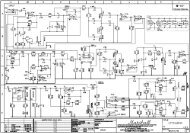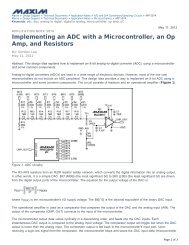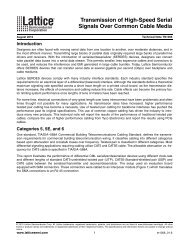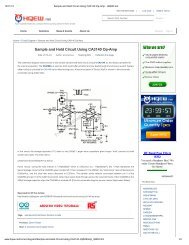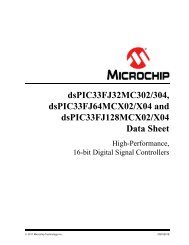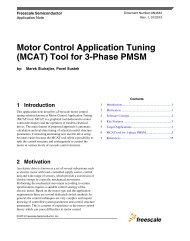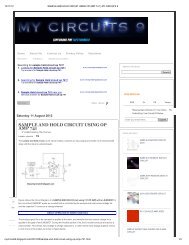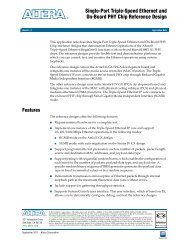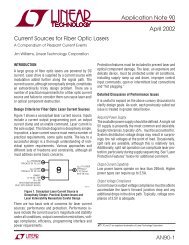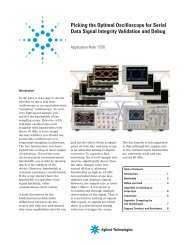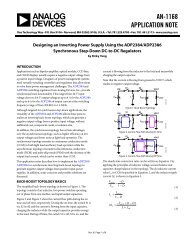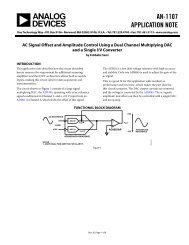ee pulse - EEWeb
ee pulse - EEWeb
ee pulse - EEWeb
You also want an ePaper? Increase the reach of your titles
YUMPU automatically turns print PDFs into web optimized ePapers that Google loves.
INTERVIEW<br />
love solving problems, so becoming<br />
an engin<strong>ee</strong>r was the right fit. Most<br />
people just don’t start by wanting to<br />
drive a train.<br />
As for electrical engin<strong>ee</strong>ring,<br />
that’s much clearer. Mechanical<br />
engin<strong>ee</strong>ring made sense<br />
because bridges could withstand<br />
earthquakes. Chemical<br />
engin<strong>ee</strong>ring made sense because<br />
material science helped me s<strong>ee</strong> that<br />
durable paints could be developed<br />
for cars. Electrical engin<strong>ee</strong>ring<br />
spanned a wide array of topics, but<br />
I was fascinated by one: how did<br />
radio waves travel through the air?<br />
I wanted to understand what magic<br />
was sending signals around and<br />
through me. It s<strong>ee</strong>med that whoever<br />
controlled those would have<br />
disproportionate amounts of power<br />
to affect people for entertainment,<br />
for medical diagnosis and even<br />
for dangerous exposure. I wanted<br />
answers and access to this amazing<br />
field. Besides, it made “Sparky”<br />
proud.<br />
What are your favorite<br />
hardware tools that you use?<br />
I’m going to assume you mean in the<br />
lab. My favorite tool is the spectrum<br />
analyzer. It breaks apart a signal<br />
into its frequency components<br />
and grants me insights that can be<br />
hidden in the time domain.<br />
What are your favorite<br />
software tools that you use?<br />
I really like Matlab. And, of course, I<br />
have to mention SPICE. The ability<br />
to simulate circuits and systems<br />
is incredible—and improving<br />
constantly. Since I’m in an optical<br />
sensors group now, I’m finding a<br />
great appreciation for SolidWorks<br />
and FRED.<br />
What is your favorite<br />
debugging tool?<br />
The human body. Think of all of<br />
the tools that you have for fr<strong>ee</strong>. Skin<br />
is a temperature sensor. Eyes and<br />
ears are bandpass filters. Noses<br />
are fantastic over-current detection<br />
devices. Tongues are decent battery<br />
testers, but I don’t recommend that<br />
unless you are stranded on an<br />
Follow your dreams.<br />
I know it sounds<br />
corny, but find<br />
something you love to<br />
do. Jobs these days<br />
stretch way beyond<br />
40 or 50 hours.<br />
There are times<br />
when my driving<br />
time, my evenings<br />
and my dreams are<br />
still churning away<br />
on a problem.<br />
island or something. Fingers are<br />
crude capacitances; touching a<br />
node can add 100pF or so which<br />
might help you quickly figure out a<br />
compensation problem. These are<br />
the kind of observations and tools<br />
engin<strong>ee</strong>rs don’t usually record in<br />
their lab notebooks.<br />
What is the hardest/trickiest<br />
bug you have ever fixed?<br />
Whichever one I’m working on<br />
right now. Bugs aren’t usually so<br />
complicated that it takes a team<br />
of geniuses to find them. It’s like<br />
finding Waldo. If he’s half an inch<br />
tall, he’s easy to spot on a baseball<br />
card. However, if he’s half an inch<br />
tall and he’s somewhere on a wall<br />
mural, it’s probably going to take a<br />
lot longer.<br />
The tricky part is finding the bug.<br />
Too many people guess without<br />
a plan. The best thing to do is to<br />
“draw a box around the problem”,<br />
to quote one of my colleagues,<br />
Ken Dyer. Then you know the<br />
bug is somewhere in the box.<br />
Methodically go through the system<br />
and verify whether each block is<br />
working properly. Eventually, you<br />
will be able to shrink the box around<br />
the problem area and focus your<br />
efforts more efficiently.<br />
The exception to this method is<br />
the case where you have loads of<br />
experience. Experience can inform<br />
you of the most likely places to look.<br />
In those cases, I’d start there.<br />
What is on your bookshelf?<br />
Some old databooks that I haven’t<br />
recycled yet, a copy of my PhD<br />
thesis on RF CMOS low phase noise<br />
oscillators, the Art of Electronics,<br />
the ARRL Handbook, a picture of<br />
me pretending to pitch to a full-size<br />
statue of Babe Ruth at the Baseball<br />
Hall of Fame, various textbooks, a<br />
roaring Godzilla doll and a photo of<br />
my 3 dogs.<br />
Do you have any tricks up<br />
your sl<strong>ee</strong>ve?<br />
It’s all about the basics. Start<br />
<strong>EEWeb</strong> | Electrical Engin<strong>ee</strong>ring Community Visit www.<strong>ee</strong>web.com 5<br />
FEATURED INTERVIEW



